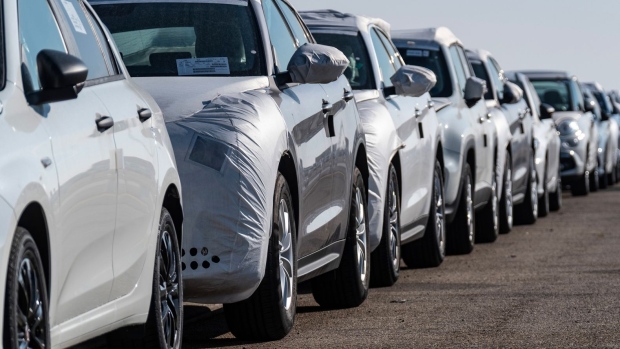Jan 21, 2020
Trump takes suddenly sunny view on European trade from Davos
, Bloomberg News

President Donald Trump came to Davos espousing his economic and trade policies as models for the world, sending some warm and some mixed messages to European nations that have endured his tariff threats on everything from cars to Camembert for almost three years.
Before arriving in the Swiss resort Tuesday, Trump and French President Emmanuel Macron had declared a temporary truce in their dispute over a French tax on foreign tech companies that drew threats of tariffs from Washington. Just last week, French officials were all but certain that the levies were imminent.
Then, in his remarks kicking off the World Economic Forum’s annual meeting in the Alps, Trump said he looked forward to “negotiating a tremendous new deal with the United Kingdom. They have a wonderful new prime minister and wants very much to make a deal.”
Later, he acknowledged that European Commission President Ursula von der Leyen is known as a “very tough negotiator, which is bad news for us, because we’re going to talk about a big trade deal.” A U.S.-European Union deal is “something we all want to be able to make,” Trump said, and there won’t be any problem requiring auto tariffs “if they’re fair.”
For a president who’s railed against the gaping trade surpluses that European nations enjoy with the U.S., his was an uncommonly peaceful visit to a conclave of doubters about American exceptionalism.
Standing on a stage of business and government leaders, Trump recited a litany of domestic accomplishments, from record-low minority unemployment in the U.S. to the growth in jobs for millennials. Among the international achievements mentioned was phase one of a trade deal signed with China last week.
That agreement cools tensions between the world’s two largest economies, but its timing has revived concern from Berlin to Brussels that he’ll turn its sights next the European Union. Trump’s prepared remarks contained no such threats, ending on his optimism that Europe’s “teeming centers of commerce and culture” would rise again, including France’s fire-ravaged Notre Dame cathedral.
“The great bells will once again ring out for all to hear, giving glory to God and filling millions with wonder and awe,” he said.
In the backdrop of Trump’s cordial appearance was the stark reality that starting trade negotiations is easy to discuss and harder to actually do. Trump’s talks with the EU have been stalled since 2018, as the European Commission leadership changed hands and the U.S. argued unsuccessfully for more access to agriculture markets. Given Prime Minister Boris Johnson’s short timetable, only a limited U.S. agreement with the U.K. is likely this year. The truce with France merely puts the digital-tax negotiations on an unclear, lengthly timetable at the Organization for Economic Cooperation and Development.
Still, the past two days have represented a partial retreat from his favorite negotiating tactic: a threat of tariffs.
Details of his latest cease fire -- with Macron -- remain murky. Trump thanked the French leader when asked about it in Davos, but did not reveal the specifics of what they agreed to. “We had a very good conversation, it worked out very well, the U.S. is very happy with the result and we appreciate very much what President Macron did,” Trump said.
Trump said his meeting with von der Leyen would be largely about trade. For her part, von der Leyen stressed the joint history of the countries and added only: “We have issues to discuss and we will negotiate.”
Trump met with the Swiss president, and extolled the virtues of trade, before thanking Macron. Trump’s speech also hailed America’s surging oil and gas production, and called on Europe to wean itself from “unfriendly” suppliers, likely a veiled rebuke of Russia.
“With an abundance of American natural gas now available, our European allies no longer have to be vulnerable to unfriendly energy suppliers either. We urge our friends in Europe to use America’s vast supply and achieve true energy security,” he said in his speech.
As the auto-tariff threat simmers, German Chancellor Angela Merkel is among the high-profile attendees at Davos. She and Trump are not scheduled to meet.
So when the day neared an end, Trump demonstrated again that he’ll play hardball, even with allies.
Speaking to reporters, he said he’s confident he can reach a trade deal with the EU but will strongly consider imposing tariffs on European cars without an agreement. “If we’re unable to make a deal we will have to do something because we’ve been treated very badly as a country for many many years on trade,” Trump said.

